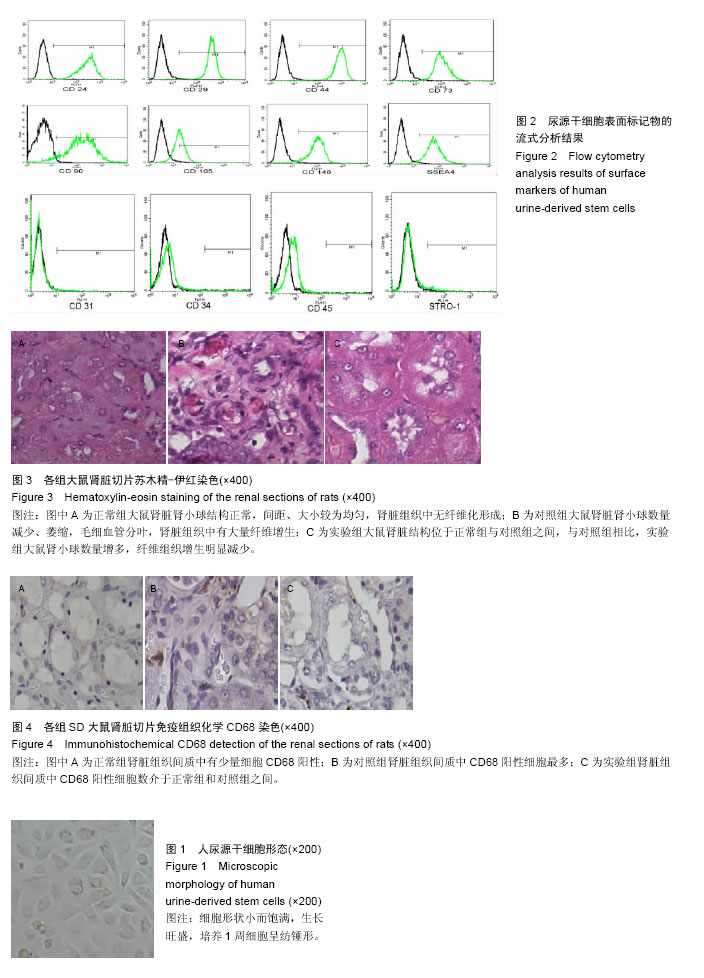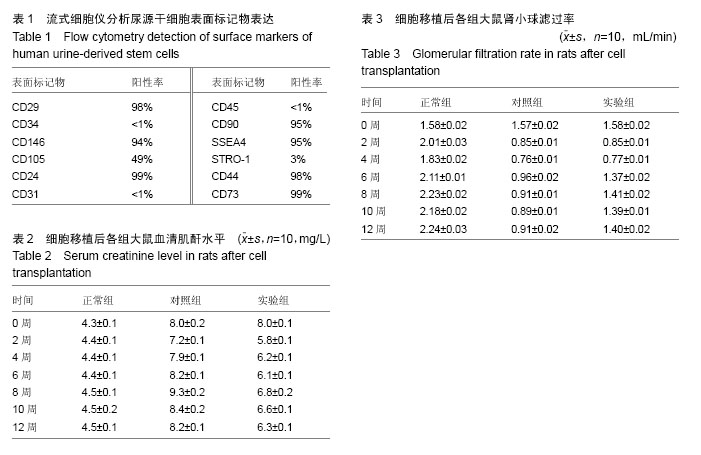| [1] Xu R, Zhang L, Zhang P, et al. Comparison of the prevalence of chronic kidney disease among different ethnicities: Beijing CKD survey and American NHANES. Nephrol Dial Transplant. 2009;24(4): 1220-1226.
[2] Baumgarten M, Gehr T. Chronic kidney disease: detection and evaluation. Am Fam Physician. 2011; 84(10):1138-1148.
[3] Coresh J, Selvin E, Stevens LA, et al. Prevalence of chronic kidney disease in the United States. JAMA. 2007;298(17):2038-2047.
[4] Rota C, Imberti B, Pozzobon M, et al. Human amniotic fluid stem cell preconditioning improves their regenerative potential. Stem Cells Dev. 2012;21(11): 1911-1923.
[5] Yamaleyeva LM, Guimaraes-Souza NK, Krane LS, et al. Cell therapy with human renal cell cultures containing erythropoietin-positive cells improves chronic kidney injury. Stem Cells Transl Med. 2012; 1(5):373-383.
[6] Villanueva S, Ewertz E, Carrión F, et al. Mesenchymal stem cell injection ameliorates chronic renal failure in a rat model. Clin Sci (Lond). 2011; 121(11):489-499.
[7] Ross EA, Williams MJ, Hamazaki T, et al. Embryonic stem cells proliferate and differentiate when seeded into kidney scaffolds. J Am Soc Nephrol. 2009;20(11): 2338-2347.
[8] Song B, Smink AM, Jones CV, et al. The directed differentiation of human iPS cells into kidney podocytes. PLoS One. 2012;7(9):e46453.
[9] Zhang Y, McNeill E, Tian H, et al. Urine derived cells are a potential source for urological tissue reconstruction. J Urol. 2008;180(5):2226-2233.
[10] Bharadwaj S, Liu G, Shi Y, et al. Multipotential differentiation of human urine-derived stem cells: potential for therapeutic applications in urology. Stem Cells. 2013;31(9):1840-1856.
[11] 中华人民共和国科学技术部.关于善待实验动物的指导性意见.2006-09-30.
[12] Dominici M, Le Blanc K, Mueller I, et al. Minimal criteria for defining multipotent mesenchymal stromal cells. The International Society for Cellular Therapy position statement. Cytotherapy. 2006;8(4):315-317.
[13] Caldas HC, Fernandes IM, Kawasaki-Oyama RS, et al. Effect of stem cells seeded onto biomaterial on the progression of experimental chronic kidney disease. Exp Biol Med (Maywood). 2011;236(6):746-754.
[14] Caldas HC, Fernandes IM, Gerbi F, et al. Effect of whole bone marrow cell infusion in the progression of experimental chronic renal failure.Transplant Proc. 2008;40(3):853-855.
[15] Rota C, Imberti B, Pozzobon M, et al. Human amniotic fluid stem cell preconditioning improves their regenerative potential. Stem Cells Dev. 2012;21(11): 1911-1923.
[16] Zager RA. Gentamicin effects on renal ischemia/ reperfusion injury. Circ Res. 1992;70(1):20-28.
[17] Wang HJ, Varner A, AbouShwareb T, et al. Ischemia/reperfusion-induced renal failure in rats as a model for evaluating cell therapies. Ren Fail. 2012; 34(10):1324-1332.
[18] Becker GJ, Hewitson TD. Animal models of chronic kidney disease: useful but not perfect. Nephrol Dial Transplant. 2013;28(10):2432-2438.
[19] Anders H, Schlöndorff D. Murine models of renal disease: possibilities and problems in studies using mutant mice. Exp Nephrol. 2000;8(4-5):181-193.
[20] Yan G, Zhang G, Fang X, et al. Genome sequencing and comparison of two nonhuman primate animal models, the cynomolgus and Chinese rhesus macaques. Nat Biotechnol. 2011;29(11):1019-1023.
[21] Quimby JM, Webb TL, Habenicht LM, et al. Safety and efficacy of intravenous infusion of allogeneic cryopreserved mesenchymal stem cells for treatment of chronic kidney disease in cats: results of three sequential pilot studies. Stem Cell Res Ther. 2013; 4(2):48.
[22] Smith JA, Daniel R. Stem cells and aging: a chicken- or-the-egg issue. Aging Dis. 2012; 3(3): 260-268.
[23] Fossum M, Lundberg F, Holmberg K, et al. Long-term culture of human urothelial cells--a qualitative analysis. Cells Tissues Organs. 2005;181(1):11-22.
[24] Fossum M, Gustafson CJ, Nordenskjöld A, et al. Isolation and in vitro cultivation of human urothelial cells from bladder washings of adult patients and children. Scand J Plast Reconstr Surg Hand Surg. 2003;37(1):41-45.
[25] Yu J, Vodyanik MA, Smuga-Otto K, et al. Induced pluripotent stem cell lines derived from human somatic cells. Science. 2007;318(5858):1917-1920.
[26] Kim NW, Piatyszek MA, Prowse KR, et al. Specific association of human telomerase activity with immortal cells and cancer. Science. 1994;266(5193):2011-2015.
[27] Prockop DJ. Marrow stromal cells as stem cells for nonhematopoietic tissues. Science. 1997;276(5309): 71-74.
[28] Pittenger MF, Mackay AM, Beck SC, et al. Multilineage potential of adult human mesenchymal stem cells. Science. 1999;284(5411):143-147.
[29] Deng ZL, Sharff KA, Tang N, et al. Regulation of osteogenic differentiation during skeletal development. Front Biosci. 2008;13:2001-2021.
[30] Rastegar F, Shenaq D, Huang J, et al. Mesenchymal stem cells: Molecular characteristics and clinical applications. World J Stem Cells. 2010;2(4):67-80.
[31] Shenaq DS, Rastegar F, Petkovic D, et al. Mesenchymal Progenitor Cells and Their Orthopedic Applications: Forging a Path towards Clinical Trials. Stem Cells Int. 2010;2010:519028.
[32] Lamplot JD, Qin J, Nan G, et al. BMP9 signaling in stem cell differentiation and osteogenesis. Am J Stem Cells. 2013;2(1):1-21.
[33] Prodromidi EI, Poulsom R, Jeffery R, et al. Bone marrow-derived cells contribute to podocyte regeneration and amelioration of renal disease in a mouse model of Alport syndrome. Stem Cells. 2006; 24(11):2448-2455.
[34] Song JJ, Guyette JP, Gilpin SE, et al. Regeneration and experimental orthotopic transplantation of a bioengineered kidney. Nat Med. 2013;19(5):646-651.
[35] 张超.尿源干细胞在治疗慢性肾病大鼠模型中的应用[D]. 上海:第二军医大学, 2014. |
.jpg)


.jpg)
.jpg)
.jpg)